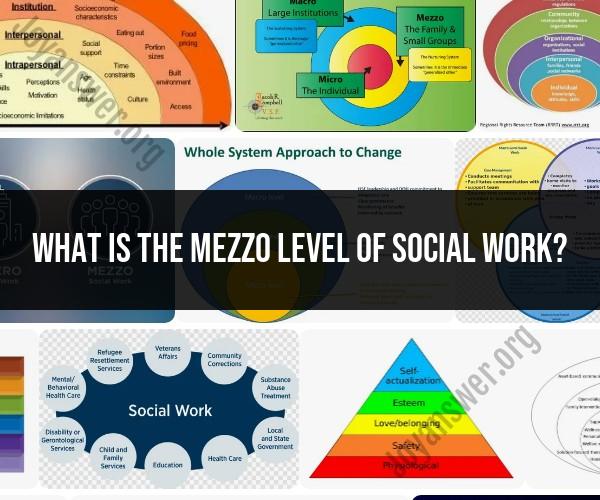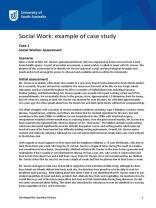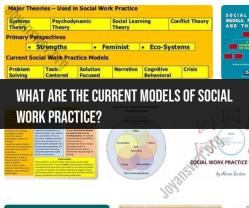What is the mezzo level of social work?
The mezzo level of social work practice is an intermediate or middle level of intervention that focuses on working with small to medium-sized groups of individuals or families. Mezzo social work typically falls between the micro level, which involves working with individuals or families, and the macro level, which involves working with communities, organizations, or systems. Mezzo-level social work practice is designed to address issues and challenges that are not confined to a single person or family but are also not as broad as those addressed at the macro level.
Here are some key characteristics and examples of mezzo-level social work practice:
1. Group Work: Mezzo-level social workers often facilitate group interventions. These groups can be therapy or support groups, educational workshops, or community organizations. The goal is to provide a supportive environment where individuals can interact with others who share similar challenges or experiences. For example, a social worker might lead a support group for caregivers of individuals with Alzheimer's disease.
2. Family Therapy: Family therapy is a common mezzo-level intervention. Social workers may work with entire families to address issues such as communication problems, conflicts, or parenting challenges. The focus is on improving family dynamics and relationships.
3. School Social Work: School social workers often operate at the mezzo level. They work with students, teachers, and parents to address behavioral issues, academic challenges, and family-related concerns that can affect a student's well-being and performance in school.
4. Community Programs: Mezzo-level social workers may be involved in developing and running community-based programs that serve specific populations, such as at-risk youth, veterans, or the elderly. These programs aim to provide services and support to a group of individuals within a community.
5. Workplace Interventions: Social workers in organizational settings may engage in mezzo-level practice by addressing workplace issues that affect groups of employees, such as conflict resolution, team building, or stress management workshops.
6. Supportive Housing: Social workers involved in supportive housing programs often work with groups of individuals who are experiencing homelessness or housing instability. They help residents access needed services and build a supportive community within the housing facility.
7. Substance Abuse Treatment Groups: Mezzo-level social workers may lead substance abuse treatment groups in which individuals struggling with addiction come together to support one another in their recovery process.
8. Advocacy and Coalition Building: Social workers at the mezzo level may engage in advocacy efforts and coalition building to address social issues and promote change. They work with various organizations and stakeholders to advance the interests of a specific group or community.
In mezzo-level social work practice, social workers often play a role in facilitating communication, providing education and resources, and helping individuals or groups build stronger support networks. Mezzo-level interventions are valuable in addressing social problems that extend beyond the individual and require a collective approach to change and improvement.
Understanding the Role of Mezzo-Level Social Work in Communities
Mezzo-level social work is a practice that focuses on working with groups and organizations to address social problems and improve the well-being of communities. Mezzo-level social workers may work with a variety of groups, such as schools, community centers, youth programs, and faith-based organizations.
Mezzo-level social workers play an important role in communities by:
- Identifying and assessing community needs
- Developing and implementing social programs and services
- Advocating for policies and resources that support communities
- Building partnerships with other organizations and agencies
- Empowering community members to take ownership of their own well-being
Mezzo-Level Social Work Interventions and Strategies
Mezzo-level social workers use a variety of interventions and strategies to achieve their goals. Some common examples include:
- Program development and implementation: Mezzo-level social workers may develop and implement social programs and services to address specific community needs. For example, they might develop a program to provide after-school tutoring to at-risk youth, or they might develop a program to provide support services to victims of domestic violence.
- Community organizing and mobilization: Mezzo-level social workers may organize and mobilize community members to take action on important issues. For example, they might organize a community meeting to discuss crime prevention strategies, or they might organize a protest to demand better access to healthcare.
- Advocacy: Mezzo-level social workers may advocate for policies and resources that support communities. For example, they might advocate for increased funding for education, or they might advocate for changes to the criminal justice system.
- Capacity building: Mezzo-level social workers may work to build the capacity of organizations and groups to address social problems in their communities. For example, they might provide training to community leaders on how to develop and implement social programs, or they might help groups to secure funding for their work.
Challenges and Ethical Considerations in Mezzo-Level Social Work Practice
Mezzo-level social work can be challenging work. Social workers may face resistance from community members, or they may struggle to secure funding for their programs. Additionally, mezzo-level social workers must be careful to navigate the complex ethical issues that can arise in working with groups and organizations.
Some of the ethical considerations that mezzo-level social workers must be aware of include:
- Confidentiality: Social workers must maintain the confidentiality of their clients, even when working with groups and organizations. This means that they must be careful about what information they share with others, and they must obtain the consent of clients before sharing any information.
- Conflicts of interest: Social workers must avoid conflicts of interest. This means that they should not work with groups or organizations that have a financial or personal interest in their work.
- Social justice: Social workers have a responsibility to promote social justice. This means that they should work to address the root causes of social problems, and they should advocate for policies and resources that benefit all community members.
Despite the challenges, mezzo-level social work is a rewarding field. Mezzo-level social workers have the opportunity to make a real difference in the lives of individuals and communities.










